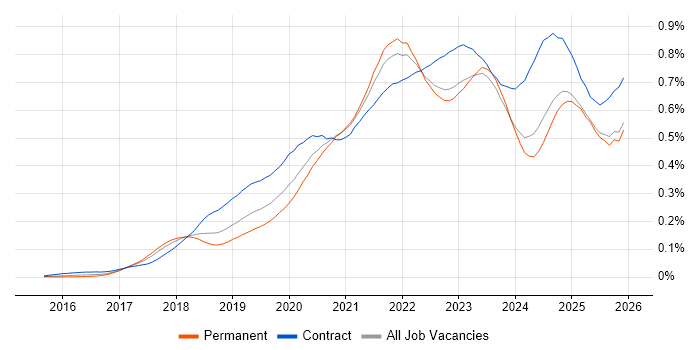Microsoft Azure Data Factory
UK > UK excluding London
The table below provides summary statistics for permanent job vacancies advertised in the UK excluding London requiring Azure Data Factory skills. It includes a benchmarking guide to the annual salaries offered in vacancies that cited Azure Data Factory over the 6 months leading up to 31 May 2025, comparing them to the same period in the previous two years.
| 6 months to 31 May 2025 |
Same period 2024 | Same period 2023 | |
|---|---|---|---|
| Rank | 398 | 522 | 425 |
| Rank change year-on-year | +124 | -97 | -50 |
| Permanent jobs citing Azure Data Factory | 188 | 251 | 370 |
| As % of all permanent jobs advertised in the UK excluding London | 0.47% | 0.34% | 0.65% |
| As % of the Cloud Services category | 2.17% | 1.04% | 1.66% |
| Number of salaries quoted | 157 | 225 | 259 |
| 10th Percentile | £42,500 | £38,750 | £42,485 |
| 25th Percentile | £51,000 | £42,500 | £48,125 |
| Median annual salary (50th Percentile) | £63,000 | £52,500 | £57,500 |
| Median % change year-on-year | +20.00% | -8.70% | +4.55% |
| 75th Percentile | £72,500 | £65,000 | £73,375 |
| 90th Percentile | £82,500 | £71,250 | £90,000 |
| UK median annual salary | £65,000 | £62,500 | £67,500 |
| % change year-on-year | +4.00% | -7.41% | +3.85% |
All Cloud Skills
UK excluding London
Azure Data Factory falls under the Cloud Services category. For comparison with the information above, the following table provides summary statistics for all permanent job vacancies requiring cloud computing skills in the UK excluding London.
| Permanent vacancies with a requirement for cloud computing skills | 8,654 | 24,030 | 22,280 |
| As % of all permanent jobs advertised in the UK excluding London | 21.81% | 32.09% | 38.87% |
| Number of salaries quoted | 5,753 | 17,653 | 13,381 |
| 10th Percentile | £28,500 | £27,500 | £30,000 |
| 25th Percentile | £36,250 | £36,750 | £40,000 |
| Median annual salary (50th Percentile) | £53,450 | £50,000 | £55,000 |
| Median % change year-on-year | +6.90% | -9.09% | +4.76% |
| 75th Percentile | £70,000 | £66,650 | £70,125 |
| 90th Percentile | £85,000 | £80,000 | £85,000 |
| UK median annual salary | £60,000 | £57,500 | £65,000 |
| % change year-on-year | +4.35% | -11.54% | +4.00% |
Azure Data Factory
Job Vacancy Trend in the UK excluding London
Job postings citing Azure Data Factory as a proportion of all IT jobs advertised in the UK excluding London.

Azure Data Factory
Salary Trend in the UK excluding London
3-month moving average salary quoted in jobs citing Azure Data Factory in the UK excluding London.
Azure Data Factory
Salary Histogram in the UK excluding London
Salary distribution for jobs citing Azure Data Factory in the UK excluding London over the 6 months to 31 May 2025.
Azure Data Factory
Job Locations in the UK excluding London
The table below looks at the demand and provides a guide to the median salaries quoted in IT jobs citing Azure Data Factory within the UK excluding London region over the 6 months to 31 May 2025. The 'Rank Change' column provides an indication of the change in demand within each location based on the same 6 month period last year.
| Location | Rank Change on Same Period Last Year |
Matching Permanent IT Job Ads |
Median Salary Past 6 Months |
Median Salary % Change on Same Period Last Year |
Live Jobs |
|---|---|---|---|---|---|
| South East | +104 | 64 | £65,000 | +6.41% | 27 |
| Midlands | +35 | 43 | £65,000 | +25.00% | 21 |
| North of England | -12 | 40 | £60,000 | +20.00% | 30 |
| West Midlands | +31 | 36 | £60,000 | +14.83% | 17 |
| Yorkshire | +66 | 21 | £60,000 | +9.09% | 8 |
| North West | -41 | 20 | £62,500 | +31.58% | 18 |
| East of England | +59 | 19 | £52,500 | +2.27% | 5 |
| South West | +102 | 12 | £77,500 | +38.39% | 9 |
| Scotland | +118 | 9 | £45,000 | -32.33% | 14 |
| East Midlands | +38 | 7 | £65,000 | +36.84% | 4 |
| North East | +37 | 3 | £52,500 | +10.53% | 4 |
| Wales | +39 | 1 | £55,000 | +19.23% | 5 |
| Azure Data Factory UK |
|||||
Azure Data Factory
Co-occurring Skills and Capabilities in the UK excluding London by Category
The follow tables expand on the table above by listing co-occurrences grouped by category. The same employment type, locality and period is covered with up to 20 co-occurrences shown in each of the following categories:
|
|
||||||||||||||||||||||||||||||||||||||||||||||||||||||||||||||||||||||||||||||||||||||||||||||||||||||||||||||||||||||||||||||
|
|
||||||||||||||||||||||||||||||||||||||||||||||||||||||||||||||||||||||||||||||||||||||||||||||||||||||||||||||||||||||||||||||
|
|
||||||||||||||||||||||||||||||||||||||||||||||||||||||||||||||||||||||||||||||||||||||||||||||||||||||||||||||||||||||||||||||
|
|
||||||||||||||||||||||||||||||||||||||||||||||||||||||||||||||||||||||||||||||||||||||||||||||||||||||||||||||||||||||||||||||
|
|
||||||||||||||||||||||||||||||||||||||||||||||||||||||||||||||||||||||||||||||||||||||||||||||||||||||||||||||||||||||||||||||
|
|
||||||||||||||||||||||||||||||||||||||||||||||||||||||||||||||||||||||||||||||||||||||||||||||||||||||||||||||||||||||||||||||
|
|
||||||||||||||||||||||||||||||||||||||||||||||||||||||||||||||||||||||||||||||||||||||||||||||||||||||||||||||||||||||||||||||
|
|
||||||||||||||||||||||||||||||||||||||||||||||||||||||||||||||||||||||||||||||||||||||||||||||||||||||||||||||||||||||||||||||
|
|
||||||||||||||||||||||||||||||||||||||||||||||||||||||||||||||||||||||||||||||||||||||||||||||||||||||||||||||||||||||||||||||
